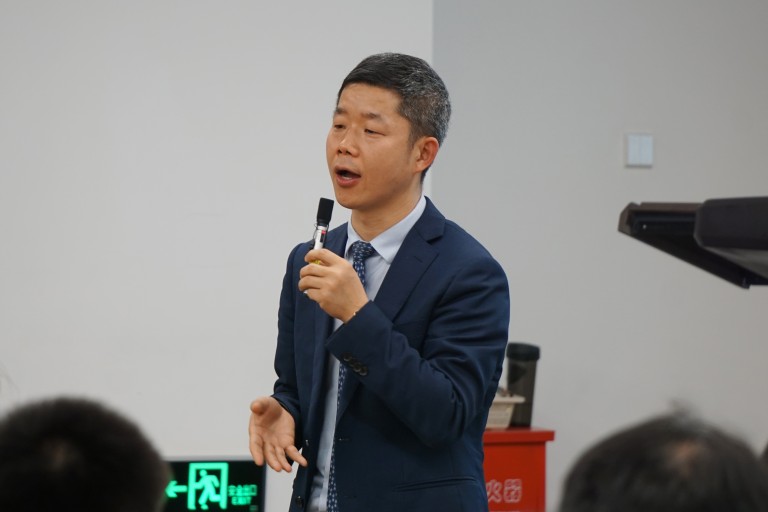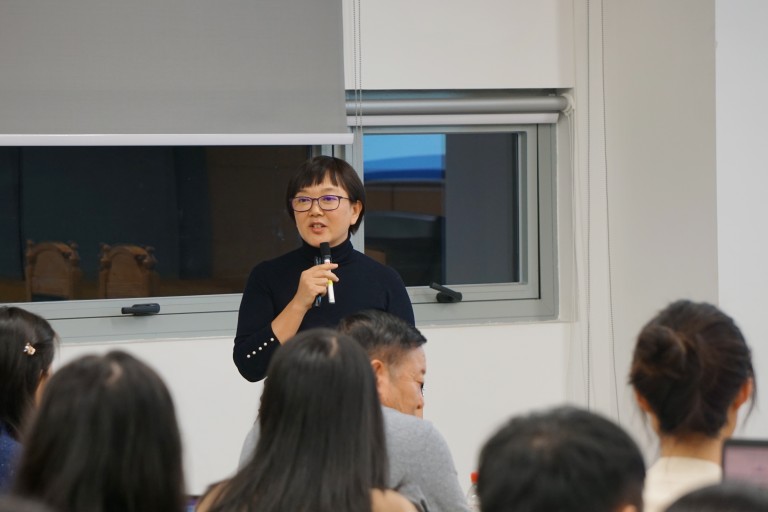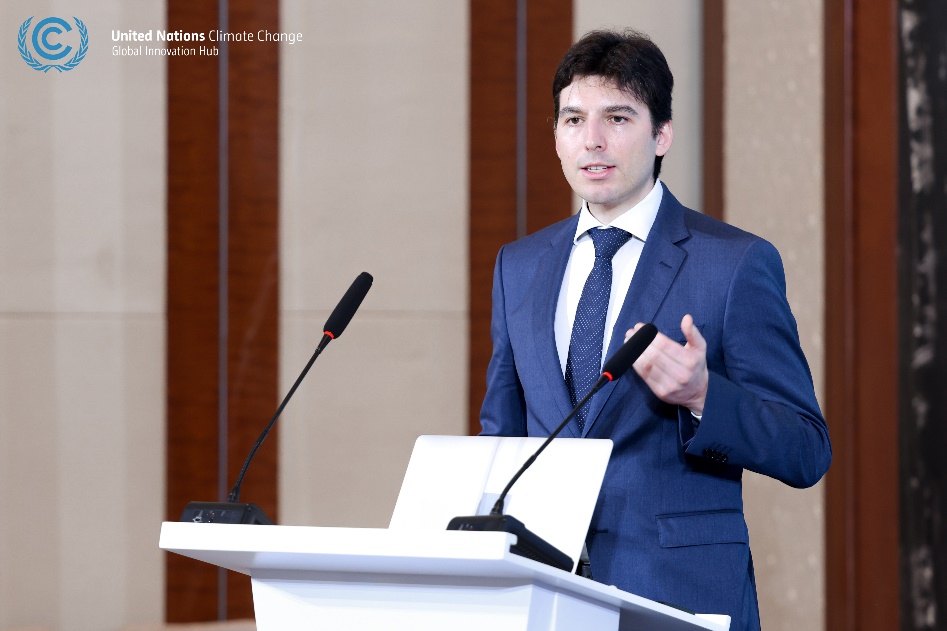Copyright © 2024 Peking University School of Transnational Law.

2019-12-06 Views: 136
On December 4th, STL Career Service Center and CIETAC South China Sub-Commission jointly held Law Career Panel on Litigation and Arbitration at STL. This Panel was moderated by Ms. Jin Xi, assistant to secretary general of CIETAC South China Sub-Commission. Ye Lu, partner of King & Wood Mallesons, Wang Chunge, director of Beijing Energy Holding Co., Ltd., and Chen Yaoquan, partner of TianTong Law Firm, were the guest speakers.

Ms. Ye is a senior partner of King & Wood Mallesons’ Litigation and Dispute Resolution Department. She has long been recognized as a leading expert in PRC-related dispute resolution in the Asia Pacific region, and as a leading lawyer in the field of dispute resolution by prestigious legal publications including Chambers China and Asian Legal Business. Ms. Ye is also a member of the Court of SIAC and chair of the One Belt One Road Subcommittee of IBA under Asia Pacific Forum.
Mr. Wang is currently a director of Beijing Energy Holding Co., Ltd., and vice chairman of China Maritime Law Association. He also serves as arbitrator and mediator in many arbitration institutions, such as CIETAC and SCIA. Before joining Beijing Energy Holding, he was the general legal counsel at China Merchants Group.
Mr. Chen is a founding partner of TianTong Law Firm. He is one of the lawyers that represented the largest number of cases before the Supreme People’s Court and obtain the highest winning rate. Mr. Chen has kept the “zero lost” record for many consecutive years. Many of his cases are viewed as leading cases that fill existing legal gaps.
At first, Mr. Chen shared his views on what it means to be a litigation lawyer. Mr. Chen shared his life experience of how he became a lawyer and partner at TianTong Law firm. Mr. Chen believes that good litigation lawyers have some shared qualities, including the sense of responsibility, the ability to cope with great pressure, creativity, and team spirit. Some basic skills are also required for litigation lawyers. The first is the ability of legal analysis and oral presentation. Litigation lawyers need to identify and summarize the core issues in large cases and explain it in a clear and concise way. The second is research skills, which requires an ability to retrieve relevant information and conduct in-depth research on the cases they represent. The last is writing skills. New beginners must adapt to the style of legal writing. They must put themselves in the judges’ shoes to write in a way that is easy for them to understand and accept.

Mr. Chen provided several suggestions on how to improve these abilities. First of all, “doing your best to accomplish your work is a prerequisite for making progress”. In addition, it is also very important to improve your shortcomings. Mr. Chen mentioned that there are several secrets behind TianTong’s high winning rate in court. First, TianTong lawyers will conduct an objective assessment before representing a case. Second, the lawyers diligently work on their cases, which has been recognized by judges. Third, TianTong lawyers will present their opinions in the most agreeable and persuasive way, minimizing the judges’ burden.
Later, Mr. Chen briefly introduced TianTong’s recruitment system and answered some questions raised by the students. In answering the question of the choice of place to practice law, Mr. Chen believed the convenience of commuting may vary from different places. Take Shenzhen as an example. Shenzhen has a good legal and business environment and a great potential for the development of the legal service market. Moreover, as an immigrant city, it satisfies the friendliness-to-outsiders factor. When asked about the systemization of China’s judicial cases, Mr. Chen believed that the quality of Chinese judicial opinions has been greatly improved due to the publication of judicial opinions. The systemization of cases requires the efforts of the entire legal professional community. TianTong only made a small contribution to it.

Next, Ms. Ye shared her views on the career planning of litigation lawyers. Ms. Ye held a positive view on the development prospects of Shenzhen and the Greater Bay Area. Shenzhen’s economic development features innovation. A large number of innovative private enterprises were born here, one of the most dynamic regions in the Chinese economic landscape. However, compared with Beijing and Shanghai, the legal service market in Shenzhen has a large gap in terms of business volume, law firm income, and professionals, which also means that it has great potential of growth. Then, Ms. Ye shared an international arbitration case she had formerly handled, and described how her team turned the difficult case to a win and received the respect of their counterparty. This case fully illustrated the importance of details and persistence. It also emphasized that lawyers engaged in international arbitration must understand the rules and learn to make use of the rules to defend their clients.
As for career advice, Ms. Ye suggested that students have various options to consider. Apart from litigation, there is a large number of non-litigation legal services in need. Engaging in non-litigation practice requires lawyers to have certain knowledge of a particular industry and requires understanding client needs. For students who wish to engage in international dispute resolution, a good mentor can provide them with much guidance. They can consider starting at an international law firm with a perfect training system. Ms. Ye also mentioned that with the development of society and technology, the forms of legal services may also undergo huge revolutions. Students need seriously consider alternatives before deciding to be a lawyer. In the end, Ms. Ye took Haben Girma, the first blind graduate of Harvard Law School, as an example to encourage young students to face the pressures and dilemmas they might face with a positive attitude with which they can identify and develop their talents.
Later, Mr. Wang shared his suggestions on career planning for in-house counsel. Mr. Wang first introduced the evolution of legal department in the state-owned enterprises, and pointed out that in-house counsel is playing a more and more important role in state-owned enterprises. Generally speaking, integrity, legal analysis skills, communication skills, team spirit, management and industrial knowledge are required for in-house counsel. In addition, with the implementation of the Belt and Road initiative, people who have both good foreign language skills and legal knowledge are in great demand in enterprises.

Next, Mr. Wang talked about his views on the relationship between the management and in-house counsel. He believes that the duty of in-house counsel is to identify legal risks and to provide solutions, while the management is responsible for balance between business opportunities and legal risks. Nowadays, in-house counsel has become a career option with both challenges and flexibilities that are worth considering.
After the three guest speakers’ speeches, Ms. Jin Xi briefly introduced the professional development in arbitration institutions. The job in arbitration institutions is stable, which can provide us with the whole picture of dispute resolution, and better understanding of the cases. With Chinese enterprises engaging in international business, more and more parties have chosen arbitration as the form of dispute settlement. Thus, arbitration has a good prospect for development in China and is, as such, also a good career choice.
During the Q & A session, guest speakers shared their views on dealing with pressure. Mr. Wang believes that pressure exists in all kinds of occupations. The key is to learn to turn the stress into motivation. By solving the problem, we will gain a sense of accomplishment and release from the stress. Ms. Ye believes that people face different pressures at different stages, which is more common for lawyers. Young people should improve their ability to resist pressure. Instead of being self-centered, they should consider themselves as part of a team, accumulating experience in the teamwork step by step. When asked about the prospects of maritime legal services, Mr. Wang believed that maritime law often involve technical issues and international disputes. With the implementation of Belt and Road, maritime law is undergoing integration with other transportation law. People with broad knowledge and good legal skills will gain more advantages in the job market. For students who are interested in international arbitration, Ms. Ye suggested that they can apply for relevant academic programs to learn more about the rules and culture of international arbitration. On the choice of place of practice, Shenzhen is adjacent to Hong Kong, and can draw many advanced experiences from Hong Kong, and is thereby a good choice to consider.
Finally, the career panel ended successfully with warm applause. The communication with top law professionals in different fields improved the students’ understanding of the industry and provided insight towards the students’ career planning.

October 14, 2024
October 14, 2024
October 14, 2024
October 14, 2024
October 14, 2024